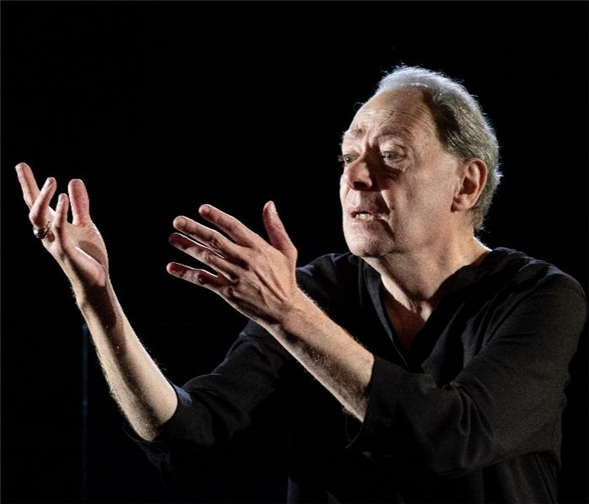Translate Page

Performer and playwright Edgar Oliver conjures a lost friend and a lost city in VICTOR
---
Over the summer I ran into playwright, poet and performer Edgar Oliver on the street. We'd met a few times before, so I greeted him with "Edgar! Hello!," perhaps too exuberantly. Unsure whether he remembered me, I added, "I am Eliza. I love your plays!" and asked if he had anything coming up.
Oliver, who has a sonorous voice and speaks in alluring ellipses, replied, "Oh… Eliza…" He said he'd have a production in the fall and then we stood smiling at each other, neither of us sure what to say. Soon we parted ways, and I regretted my enthusiasm, wondering if I'd been too pushy. But I recently reconsidered our interaction when I saw Oliver's latest solo show VICTOR, currently running at Axis Theatre Company.
Directed by Randy Sharp with music by Paul Carbonara, VICTOR is a 70-minute monologue about Oliver's longtime friend and on-and-off-again lover Victor Greco. A larger-than-life Popeye-eque figure, Victor was as brawny as he was loquacious, yet he ended up homeless and ultimately died alone in an abandoned van. But the show is about much more than its title character; it's about old New York, the passage of time, longing and the desire to express the ineffable.
Throughout the show Oliver, who's 63, acknowledges the difficulty he has putting words together these days. "I speak less and less," he observes. "As the years pass, I find it increasingly difficult to say anything." He acknowledges that he writes things he would never say off-stage, which lends his shows an irresistible confessional quality. While watching VICTOR, one senses that the performance is intended for its namesake. It feels like a prayer or an offering, but also a kind of absolution for the things we've all left unsaid.
Oliver moved to New York City from Savannah, Georgia in 1977 and soon began performing at clubs and on stage, and writing plays produced by La MaMa and other downtown theatres. A natural and compelling storyteller, he was encouraged to turn some of his real-life tales into monologues by Sharp, the artistic director of Axis Theatre Company. Over the past decade, Axis premiered three of Oliver's lyrical, funny and dark monologues -- East 10th Street: Self Portrait With Empty House, In the Park and Attorney Street -- which were eventually presented as his New York Trilogy.
Yet despite their 20-year friendship, Victor never saw Oliver perform. "He never asked so I never broached it," Oliver says. When pressed on whether he regrets that, he demurs before responding, "I think I was a little scared of Victor being in the audience for one of my shows."
{Image1}
Oliver's unflinching honesty can be hard to watch; as viewers, it forces us to reevaluate how we see ourselves. But it can also prove cathartic. If Oliver can recognize his own flaws, surely we can, too. "The show is sort of scary for me to do," Oliver admits. "I feel like it's very self-revealing. I talk about things that I consider to be deep failures in myself." At the same time, it's also good fun. Oliver's "Roach Dance," an instruction on how to frighten away cockroaches, is particularly delicious.
Oliver writes chunks of a show over time and then puts everything together with a director, usually Sharp or Catherine Burns of The Moth. "It's very collaborative," says Oliver. "Once I figure out the shape it helps me see what else needs to get written." When asked how he edits his work, Oliver blinks. "In VICTOR I say, 'The first draft is IT.' I really do mean that! For me it just works out that way, always. The piece doesn't change; assembling the pieces does. The more pieces you have, the easier it is to add stuff."
For someone who writes for the theatre, Oliver confesses he's not that well-read in terms of plays, though the number of books in his art-and-plant-filled apartment seem to indicate otherwise. "I say in the show that the main reason I write is that it's so difficult for me to speak," he explains. "I do try very hard to convey myself in talking to people. I feel that I am very bad at it, so I try to make up for that by writing. I probably sound like a half-wit; I think in some ways I am! Everything I have ever written is probably told from the perspective of a 12-year-old. I think I'm maybe stuck there, yes…"
In the lobby of Axis Theatre Company is an installation featuring an array of notes that Victor left for Oliver during the course of their relationship. Victor's handwriting befits his personality: all caps, clear as day, almost muscular. During our interview, I ask to see Oliver's penmanship and he obliges by pulling out a notebook. His is all gothic curlicues and sensuous vowels, the polar opposite of Victor's. I'm unsure of what to say -- I suddenly feel timid and full of longing myself -- so we sit and smile in silence.
---
Eliza Bent is a playwright, performer, and sometime pundit. Follow her on Instagram at @getbentobox. Follow TDF on Instagram at @tdfnyc.
Top image: Edgar Oliver in Victor. Photos by Pavel Antonov.
TDF MEMBERS: Go here to browse our latest discounts for dance, theatre and concerts.